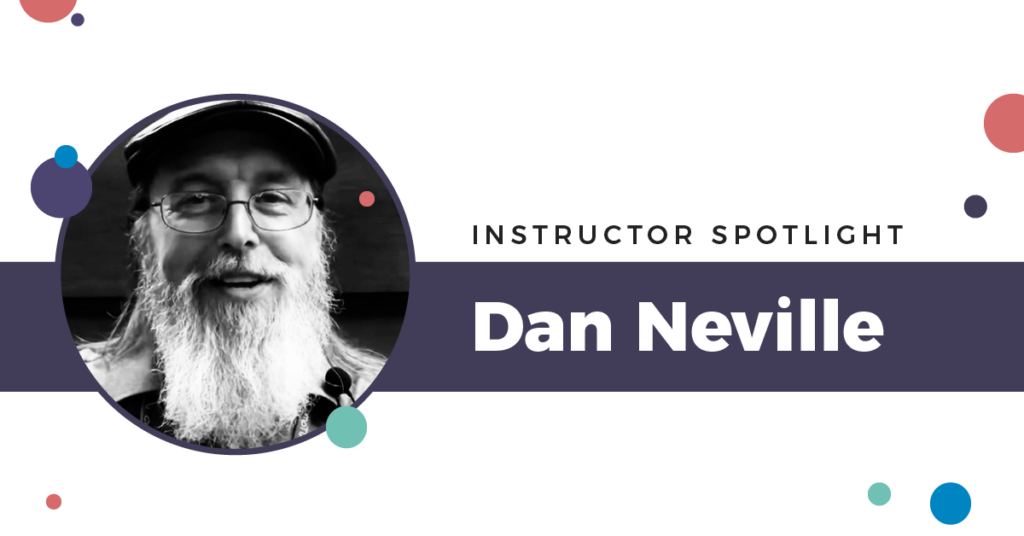Welcome to our newest post in N2K’s Instructor Spotlight Series, where we interview the certified instructors who teach our courses and write our instructional content. In this episode, we connect with Dan Neville, the CompTIA Specialist at N2K. The following interview has been edited for clarity and brevity.
Since this interview was first published, N2K has joined forces with CyberWire, the world’s largest cybersecurity audio network, to form N2K Networks. We’re the world’s first news-to-knowledge network to put you in the know on the latest in the industry, on your team, and on the stuff you need to advance your career, all in one place.
N2K: What do you do here, and what are you most excited about in your role?
Dan Neville: I work with all of N2K’s CompTIA certification products, from courses to practice exams. I’ll soon be doing some teaching, which I love. What I like best about my role here is that I can bring my experience working in community colleges to help our students understand the concepts and terminology. We’re not just saying, “Here’s a fact. Memorize it.” I like to help students understand the material by putting it in context. If you take the mystery out of IT and apply it to the real world, suddenly the hocus pocus and mumbo jumbo all go away and students can buy into it.
CV: How did you get started in IT?
DN: When I was young I worked in retail and delivered pizzas, just like a lot of my students. I decided there had to be a better way to make a living, so I found a technical school and said, “You know what? I think I can do this.” I enrolled in computer science and just fell in love with databases. The career services office got me a data entry job at a real estate firm, and I was like, “Okay, well, everyone has to start somewhere.” But while I was doing data entry, I saw my coworkers making mistakes, so I went to the boss and told him that I had some ideas for how technology could sell his properties a whole lot faster. He said, “Okay, smart guy, you’re on.” They implemented some of my changes and sold out three communities in a month. Then they fired the database manager and gave me that job. I never looked back. Going back to school changed my life, and for most of the past 20 years, that’s what I’ve helped other people do. It’s a lot of fun.
CV: Tell us a little about your background and experience.
DN: I’ve helped a number of CompTIA academy partner institutions build their curricula and degree programs and work with accrediting bodies at the national and state level. I’ve also helped build workforce development programs. Before that, when I was still just a teacher, I realized my students needed more than the classes that led to a degree. I was working at a school that didn’t believe in certifications and wouldn’t let me bring CompTIA certifications into the curriculum. One day one of my former Deans asked me to build a Cybersecurity and Forensics Associates program, which was one of the first of its kind in the US. He knew that I wanted to include certifications so that students could have both the book learning and the industry credential that says, “I know what I’m talking about” rather than “I passed the course.” That program led me to a very long relationship with CompTIA.
In fact, one year I was a speaker at a CompTIA conference and I met another speaker who worked for N2K as their CompTIA program developer. She hired me as a contractor, so I wrote content for the A+, Network+, Security+, and IT Fundamentals exams long before I became an employee. It’s very exciting that I get to do this all the time now as a full-time N2K instructor and content creator. I get to write questions, write courseware, write materials in the best way I know how. It’s pretty cool.
CV: What was your first experience with IT training?
DN: It was kind of crazy. After two years of college I went to work for a telecommunications company. I was their first employee and I was managing databases and six computers all by myself. So my boss went to the local university and hired a bunch of graduating students, all with different degrees, none of which were IT related. I said, “Dude, none of them know anything about IT.” He said, “Exactly. You get to teach them.” And at this time there were no books, no manuals, and no software for what we needed to do, so we were building the tools as we went along. I had to train these students very quickly. I learned how to break really high-level concepts down into terms a layperson could understand. I could teach them programming, or data mining, or data warehousing, or GIS mapping, and they could learn all of it.
Meanwhile, I had gone back to school to get my master’s degree, and one day an instructor didn’t show up to teach the database class. So I just got up and taught the class myself, because I’d already been doing that at my job. I’ve been (officially) teaching IT ever since.
CV: Why do you think certifications are important?
DN: I’ve believed strongly in certifications ever since I discovered them. Typically, a course is considered good at the college level if a certain number of students pass the course. There’s not really much outside validation. We don’t know exactly what they’re teaching, and we don’t know how that course compares to the real world. If nothing else, certifications are an independent evaluation and validation of your skills and knowledge. The student or job seeker can take it to an employer and prove they have the skills. Also, gaining certifications is a confidence builder. I’ve seen time and again how it leads my students to more success and a willingness to take on bigger challenges.
CV: How should individuals choose a certification to pursue?
DN: There’s two different considerations: If you already work in IT, look at job boards and find jobs that you’d like to pursue. A lot of jobs will list a particular certification as a requirement, so you can work towards getting that certification.
If you don’t have any experience in IT, start out with something that’s core like IT Fundamentals. It’s a broad base that is going to help you understand the terminology and concepts before you tackle something as mile-wide and three inches deep as A+. Then, as you get exposed to things, you may stumble upon something that strikes your interest and choose that as a direction. Remember that a certification like CISSP is going to be a golden ticket, but it’s also an advanced skill level that you have to work up to. You have to understand hardware, networking, basic cybersecurity. It’s like becoming a pilot. You may want to fly a jet, but you have to go to school and learn how to fly a two-seater Cessna first. It’s the same thing in IT. After you get the basics down, you can build on that as fast as you want to.
CV: What do you like to do for fun outside of work that people wouldn’t normally expect?
DN: A few years back, my wife and I started a self-defense products business. We sell online and we travel all around the eastern US doing trade shows and consumer shows. We’ve been doing it for about 8 years now. That is my second biggest passion — helping people stay safe.

Pictured: Dan and his wife at a tradeshow for their self-defense products business
CV: What’s one piece of advice you would give to someone who is interested in a career in IT?
DN: If you’re reading this and thinking “I’d really like to do that, but man, I don’t know,” don’t give up! Just stick with it. You can find a training program that will get you an entry-level IT position in four months. Apart from IT certification courses, there are lots of free videos out there on the internet. If your instructor doesn’t explain it well enough, then Google a video or get on one of the discussion forums. And if you fail an exam, that’s not a big deal! A lot of the programs have a 70% first-time pass rate. That’s great, but it means that 30% of the students fail their first attempt. The question is not how many times you fall down, it’s how you dust yourself off and get back up. If you don’t pass an exam, it will tell you the exact areas that you need to work on. Go back, study those areas, and take the exam again later. Google is your best friend. Type in whatever the term is and there’s lots and lots of things out there that will help you out. Use the materials to help fill in the gaps that you don’t know.
Some of the best study materials, like those we produce at N2K, teach you the concept behind why the right answer is right and the others are wrong. You’re going to get a completely different question on that topic when you take the live exam, so it’s important that you understand the background. If you try to just memorize the answers, you’re going to fail miserably.
There’s nothing more that instructors want to do than help you succeed. That’s a badge of honor for us. And a lot of times, we don’t realize the impact we make on the learner until we get an email 10 or 15 years later that says they’ve now got a successful career doing that thing you taught them. So don’t give up. It’s going to be hard work, but if it wasn’t hard work then it wouldn’t be worth it.
The report I saw last week said that there are 800,000 jobs in IT that are not filled. The problem is that there are millions of people who don’t know that they’re part of the solution. Truck drivers, nannies, warehouse workers, carpenters— these are all people that I’ve trained who had no experience and are now working in IT. You can do it. You bring what you have to the table and we can help you with the tech stuff. We teach to watch our students succeed. Just give it a shot. We can help you.


